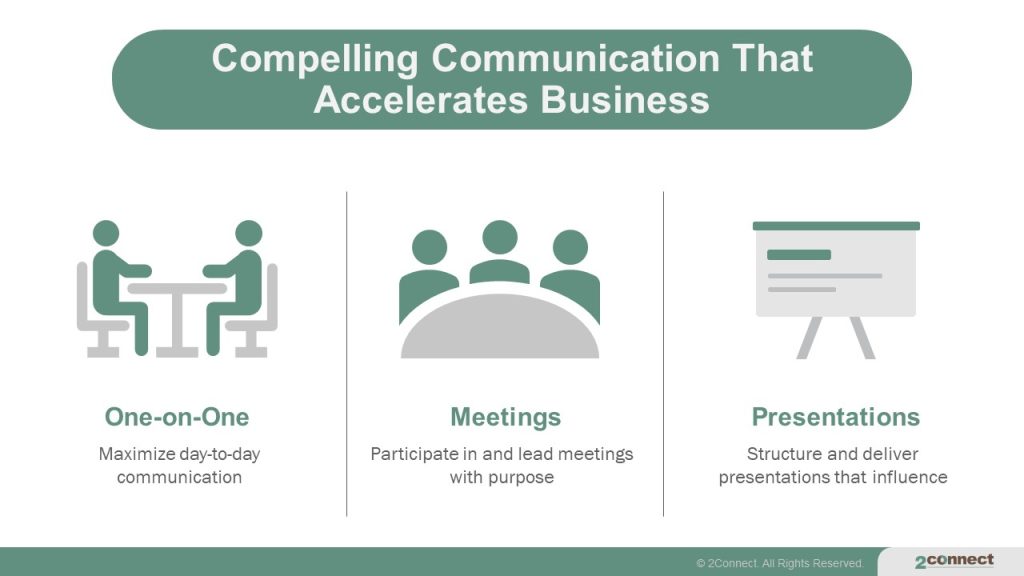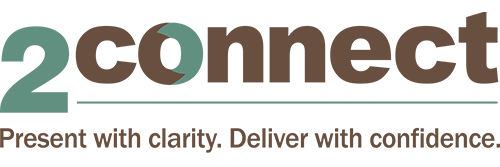
Diane West, president of 2Connect, recently sat down with Carol Wells, our newest member of the 2Connect team, to discuss the role of effective communication in organizations. With decades of Sales and Training Leadership roles in large corporations in the healthcare space, Carol knows firsthand the value of organizational communication capability as a competitive advantage.
Since we tend to overlook how much of an impact day-to-day communication can make, we are excited to share some of Carol’s insights that speak to the importance of daily communication skills in the workplace. We hope Carol’s perspective helps you think about how to uplevel your own communication landscape.
As a leader in large organizations for many years, what is your perspective on the importance of day-to-day communication skills within a team?
I have always viewed every personal interaction as an opportunity to move the business forward – whether the situation is a 1:1 discussion, a meeting of stakeholders or a large presentation. I have seen “presentation skills” get a lot of attention and development support, but I believe day-to-day communication needs an equal amount of attention when it comes to coaching and training. Think about how much time individuals spend communicating outside of presentations!
Regardless of communication setting, the communication I have seen move the business forward is clear, concise, and made relevant to the listener. This capability is truly invaluable. In fact, it’s even more important today to be a great communicator as the competition for our attention has intensified like never before.
Can you share an example of how this “day-to-day” communication can create either a positive or negative impact?
I worked with a colleague that came to every 1:1 with a clear mission. I’m not sure she knew the 2Connect CORE, CARE, DO® framework, but she employed the concepts without fail. She not only started each interaction with a headline message (CORE Message), but she always told me right up front why it was important to me (CARE) and I always knew what she needed from me to move things forward (DO). I will add that she always set a timer on her phone for the meetings because it was also part of her mindset to invest everyone’s time wisely. She was a well-respected leader in the organization and was looked upon as someone who could get things done. This approach may have been her secret sauce!
Reflecting on your role in leading a commercial training organization in the life sciences industry, what have you seen work, and not work, when it comes to developing this skill set?
While this idea of clear and concise communication seems simple, I can confirm it can be a challenging skill set to develop. I have seen leaders use a “one and done” approach to improve communication skills and be disappointed that the training didn’t stick. From personal experience and from supporting many leaders looking to develop communication skills in their teams, I have found that two key things help to move the needle with this skill set.
- Look at developing this skill over time since shifting behaviors takes time and focused effort. Commitment to training, practice and feedback overtime is critical. When new communication habits become second nature, a skilled and unconscious strategic approach to all interactions follows. It is amazing how much traction and advancement comes from that shift.
- There is power developing the skill as a team. Research shows that peer coaching can be as effective as managerial coaching. Working together on a skill is a powerful way to accelerate learning and accountability to its application. The team focus helps extend the learning beyond the classroom to “in-the-moment”, using the new language they have learned together to provide immediate feedback.
What advice or insight would you share regarding budgets that might be tight? What should a leader consider when deciding where to place their financial bets?
I would encourage leaders to think about how much more successful a person, a department, and an organization can be if they build this effective communication muscle with their people. Time is a fixed resource for all of us and using it to become a better communicator in a world that is bombarded with messaging should be a high-priority investment to stay competitive.
2Connect is honored to be able to leverage Carol’s expertise to help our clients evaluate their own organization’s communication capabilities. If you are interested in learning more about how this investment in communication can change your business by making every interaction count, please reach out to Catriona Breider at
To partner on this investment, 2Connect will honor 2023 pricing on all engagements that are booked for 2024 from now through the end of this year.





